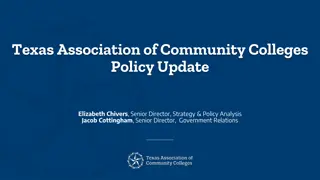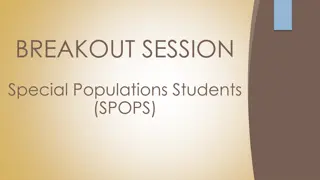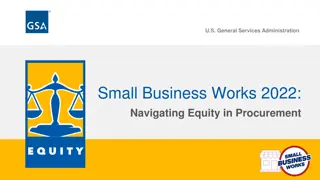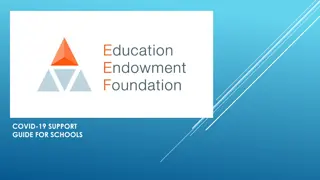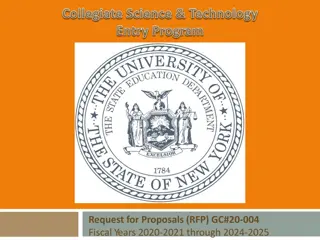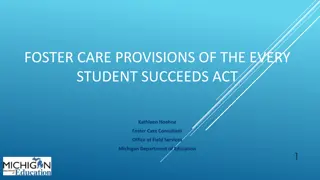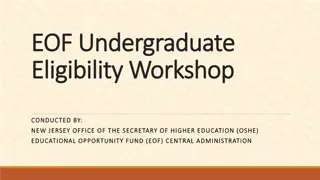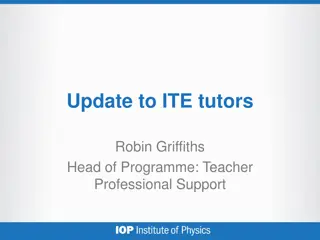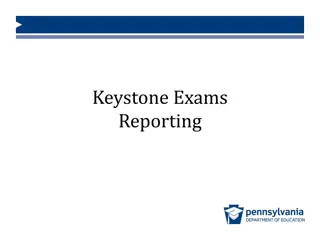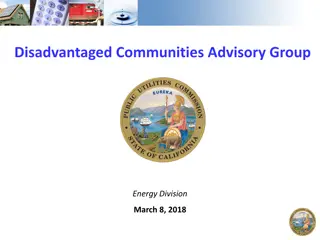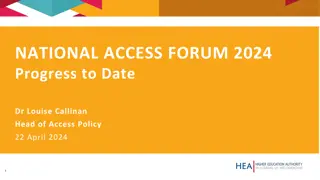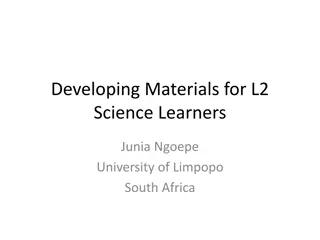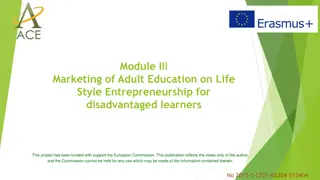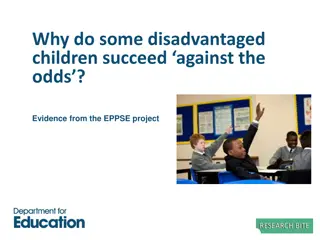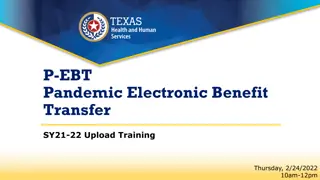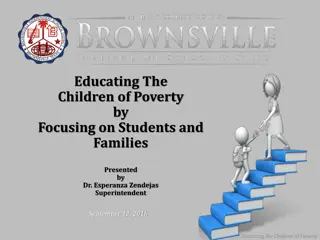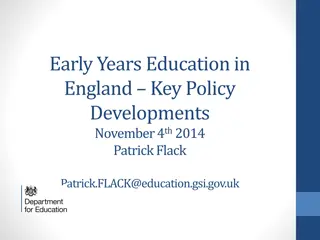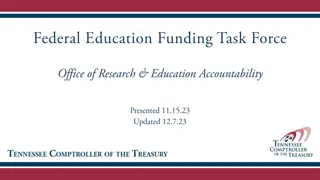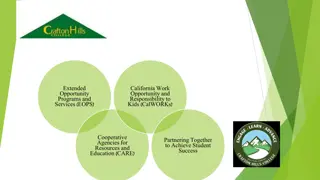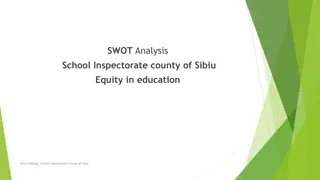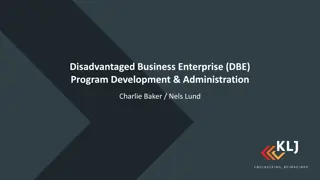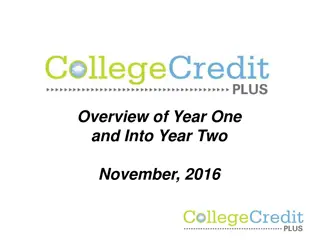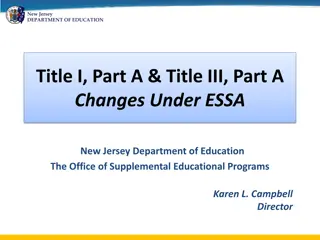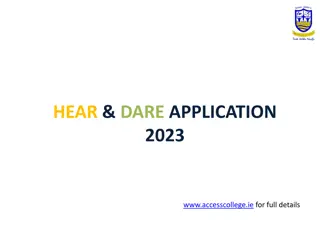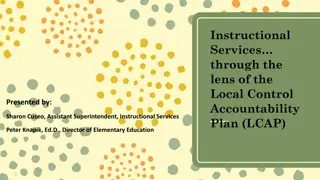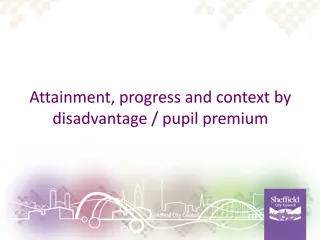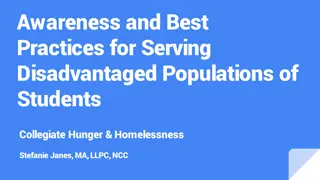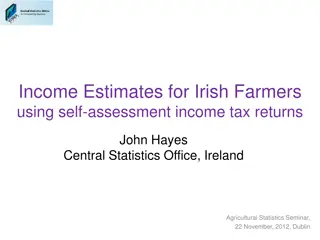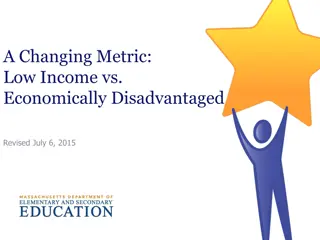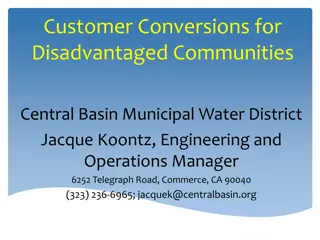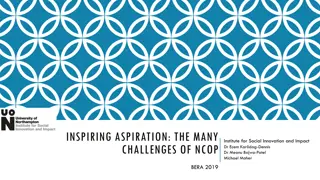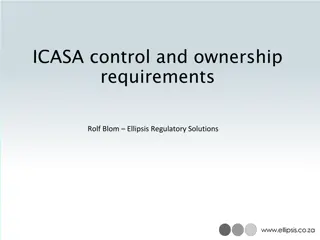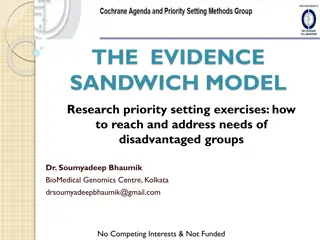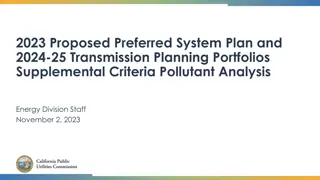Overview of U.S. General Services Administration's Office of Small and Disadvantaged Business Utilization (OSDBU)
This overview discusses the role of the Office of Small and Disadvantaged Business Utilization (OSDBU) within the U.S. General Services Administration (GSA). It highlights the advocacy for small businesses in federal acquisitions, inclusion of small businesses as contractors, and management of small
3 views • 51 slides
Climate Justice & Disadvantaged Communities: Environmental Issues in US EPA Region 2
Climate justice and the impact on disadvantaged communities are key environmental issues addressed by Adriana Espinoza, Deputy Commissioner for Equity & Justice in US EPA Region 2. The initiative identifies and prioritizes disadvantaged communities based on multiple criteria, including environmental
5 views • 18 slides
Exploring the Masters of Studying MBBS in Russia
One of the foremost compelling reasons for choosing Russia as a goal for MBBS is its affordability. Compared to many Western nations, the cost of tuition and living expenses in Russia is altogether lower. This makes seeking after an MBBS degree in Russia a monetarily reasonable alternative for numer
2 views • 5 slides
Texas Association of Community Colleges Policy Update Overview
This update highlights key components of House Bill 8 focusing on financial aid for Swift Transfer, shared services, performance tier, base tier, and the Community College Standing Advisory Committee. It also discusses the state's investment in community colleges, the HB 8 funding model, and the tra
0 views • 18 slides
Understanding Special Populations Students in CTE Programs
Special Populations Students in Career and Technical Education (CTE) programs include individuals with disabilities, economically disadvantaged individuals, single parents, English Language Learners, migrants, homeless individuals, and more. These students may require Individualized Education Progra
0 views • 9 slides
Understanding the 8(a) Business Development Program and Equity in Procurement
The 8(a) Business Development Program, created by the U.S. Small Business Administration, aims to assist socially and economically disadvantaged small businesses in developing and growing. This program provides opportunities for small companies to secure federal contracts and procurement. The progra
2 views • 31 slides
Support Strategies for Schools During the COVID-19 Pandemic
In response to the challenges brought by the COVID-19 pandemic, this guide offers support strategies for schools, emphasizing the importance of adapting teaching methods, providing targeted support, and implementing wider strategies to benefit all students, especially those disadvantaged. The guide
1 views • 13 slides
Funding Opportunity: CSTEP Grant Program for 2020-2025
The Collegiate Science and Technology Entry Program (CSTEP) is offering grants for the fiscal years 2020-2021 through 2024-2025 to increase access for minority and disadvantaged students to academic programs in scientific and technical fields. The RFP outlines important dates, eligibility criteria,
1 views • 44 slides
Foster Care Provisions of Every Student Succeeds Act
National and Michigan statistics highlight the challenges faced by youth in foster care. The Every Student Succeeds Act of 2015 aims to ensure students in foster care receive support and opportunities for academic success. The act emphasizes high academic standards, data reporting, and protections f
0 views • 35 slides
Educational Opportunity Fund (EOF) Undergraduate Eligibility Workshop
Educational Opportunity Fund (EOF) Undergraduate Eligibility Workshop, conducted by the New Jersey Office of the Secretary of Higher Education (OSHE), provides an overview of EOF's mission, recruitment and admission processes, eligibility requirements, campus communication, and support for various s
1 views • 38 slides
Empowering Physics Teachers: Innovations in Professional Development
Discover the latest updates and initiatives in physics teacher training and support programs led by Robin Griffiths and the Institute of Physics (IOP). From stimulating physics networks to nurturing future physics leaders, these projects aim to enhance teaching practices, support disadvantaged stude
7 views • 11 slides
Guide to Keystone Exams Reporting Procedures
Keystone Exams Reporting provides detailed instructions on submitting accurate data to the Pennsylvania Information Management System (PIMS) for grades 3-12 students. The process involves updating templates, ensuring data quality, running verification reports, and complying with snapshot deadlines.
0 views • 14 slides
Disadvantaged Communities Advisory Group - SB 350 Related Programs and Appointments
The Disadvantaged Communities Advisory Group focuses on the implementation of SB 350 and related programs to benefit disadvantaged communities. The group prioritizes access to clean energy technologies, affordability of energy services, and maximizing economic and environmental improvements. Appoint
0 views • 11 slides
Progress Update on National Access Forum 2024 Goals
The National Access Forum 2024 has set ambitious goals for higher education in Ireland, aiming for inclusivity, diversity, and equitable opportunities for all students. The focus is on increasing access for underrepresented groups such as those from socio-economically disadvantaged backgrounds, matu
0 views • 14 slides
Supporting English Second Language Science Learners at University of Limpopo
Developing materials for L2 science learners at University of Limpopo to support previously disadvantaged English second language science learners. The program aims to help students succeed in Maths and Sciences, enabling more black students to enter science-based programs. Focus on improving Englis
3 views • 34 slides
Marketing Strategies for Adult Education in Entrepreneurship
This project focuses on developing marketing competences for adult educators to engage disadvantaged learners in lifelong learning and entrepreneurship training. The aim is to empower learners through effective marketing strategies and communication channels, highlighting the social and psychologica
0 views • 39 slides
Woodlake Hills Middle School - Title I Program Overview
Woodlake Hills Middle School emphasizes parent and family engagement through its Title I program, offering additional academic support and opportunities for socioeconomically disadvantaged students. The school holds annual meetings to inform parents about the program, their rights, and the benefits
1 views • 13 slides
Understanding How Disadvantaged Children Succeed: Insights from the EPPSE Project
Disadvantaged children often face challenges in education, but some manage to succeed against the odds. The Effective Pre-School, Primary, and Secondary Education (EPPSE) Project sheds light on the factors contributing to their success. Parents play a crucial role by actively engaging their children
0 views • 12 slides
P-EBT SY21-22 Upload Training and Eligibility Guidelines
P-EBT program offers benefits for students affected by the COVID-19 pandemic. The training covers eligibility criteria, file preparation, key dates, and support details. Campus and student eligibility requirements are outlined, emphasizing the importance of being approved to operate NSLP, experienci
0 views • 20 slides
Striving for Educational Equity in Brownsville ISD
Dr. Esperanza Zendejas, the Superintendent of Brownsville ISD, discusses the initiatives implemented to support students and families facing poverty. The district, with a high percentage of economically disadvantaged students, focuses on expanding opportunities, supporting student achievement, and c
0 views • 9 slides
Key Policy Developments in Early Years Education - England 2014
The early years education landscape in England underwent significant changes in 2014, focusing on providing entitlements for three- and four-year-olds, with recent extensions for two-year-olds. The government aimed to support school readiness and parental labor market access through various interven
0 views • 9 slides
Understanding Special Populations Students in CTE Programs
Students who have special learning needs are considered special populations students in CTE programs. They include individuals with disabilities, economically disadvantaged individuals, single parents, English Language Learners, migrants, homeless individuals, youth in foster care, and youth with pa
0 views • 9 slides
Title I & II Grant Programs Overview
The Title I & II grant programs aim to improve academic standards for disadvantaged children through schoolwide and targeted assistance programs. Title I, Part A focuses on basic program improvement, emphasizing supplemental support, school-based decision-making, and parent involvement. Funds alloca
1 views • 10 slides
Federal Funding Allocations for Education Programs in 2023
The detailed breakdown of federal funding allocations for various education programs in 2023 includes grants for disadvantaged students, individuals with disabilities, child nutrition, effective instruction support, career and technical education, and more. The funds also cover nonrecurring grants f
0 views • 18 slides
Opportunities for Student Success: EOPS, CalWORKs, CARE Programs
Providing essential support services, the EOPS program aids economically and educationally disadvantaged students in achieving higher education success. CalWORKs and CARE programs offer additional assistance for students facing unique challenges, aiming to enhance their academic journey and career p
0 views • 12 slides
SWOT Analysis of School Inspectorate for Equity in Education in Sibiu County
This SWOT analysis focuses on the School Inspectorate in Sibiu County, examining strengths like national programs ensuring education quality, weaknesses such as lack of equity studies, opportunities like government support for minority students, and threats including high absenteeism levels and drop
0 views • 7 slides
Developing and Administering a DBE Program for Small Businesses
The Disadvantaged Business Enterprise (DBE) Program aims to support small businesses owned by socially and economically disadvantaged individuals. These individuals belong to various groups such as Black Americans, Hispanic Americans, Native Americans, Asian-Pacific Americans, Subcontinent Asian Ame
1 views • 16 slides
Insights into the 2015-16 Academic Year Participation
The 2015-16 academic year saw over 52,000 students participating, showing an increase over the past two years. The majority of these students were from high schools, with females over-represented in the CCP student population. Disparities were observed based on racial/ethnic categories, and about 14
0 views • 25 slides
Changes in New Jersey Department of Education Under ESSA
The New Jersey Department of Education has implemented changes under the Every Student Succeeds Act (ESSA) to improve the academic achievement of disadvantaged students and enhance basic programs in schools serving low-income families. These changes provide supplemental funding to support quality ed
0 views • 20 slides
Higher Education Access Routes 2023: HEAR and DARE Applications
HEAR and DARE are Higher Education Access Routes for students facing financial or health-related challenges. Eligible candidates may secure college placements with reduced points and additional support. Various colleges participate in these schemes to help disadvantaged students realize their educat
0 views • 19 slides
Overview of Instructional Services through LCAP
Explore how Instructional Services, including Elementary Education, Special Education, Child Development, Instructional Technology, Arts & Career Technical Education, and Induction programs, are structured and evaluated within the context of the Local Control Accountability Plan (LCAP). The organiza
0 views • 38 slides
Improving Attainment and Progress of Disadvantaged Pupils in Sheffield
Attainment and progress of disadvantaged pupils in Sheffield show an improving trend across key stages, although the gaps between disadvantaged and non-disadvantaged students are not closing fast enough. Data suggests that disadvantaged pupils with low prior attainment are making better progress in
0 views • 29 slides
Understanding Collegiate Hunger and Homelessness Among Disadvantaged Student Populations
This collection of resources sheds light on the challenges faced by disadvantaged students in terms of collegiate hunger and homelessness. It discusses the myth of meritocracy, the importance of self-awareness, and presents insights from the "Hunger on Campus Report," highlighting food security leve
0 views • 16 slides
Analysis of Irish Farmer Incomes Based on Income Tax Returns
This paper presents an analysis of Irish farmer incomes in 2010 using self-assessment income tax returns from the Revenue Commissioners. The study focused on various income sources such as trading income, rental income, employment income, social welfare transfers, and pension income. The dataset com
0 views • 12 slides
A Changing Metric: Low Income vs. Economically Disadvantaged
Historical data on low-income students in Massachusetts, collected for various purposes including school nutrition, federal entitlement allocations, and research projects. The introduction of the Community Eligibility Provision (CEP) program in 2011 aimed to provide free meals to qualifying students
0 views • 14 slides
Enhancing Water Accessibility for Disadvantaged Communities through Recycled Water Conversions
Design and installation of recycled water pipeline laterals, conversion of 9 sites in 6 Disadvantaged Community locations, and expansion of recycled water use to benefit communities. Project includes outreach strategies, funding details, and program preferences aimed at reducing groundwater pumping
0 views • 10 slides
Addressing Challenges of Disadvantaged Students Through NCOP Outreach
This research paper delves into the National Collaborative Outreach Programme (NCOP) and its impact on disengaged and disadvantaged students, focusing on parental engagement and wider social issues. Drawing on Bourdieu's cultural capital concept, the study evaluates the effectiveness of NCOP activit
0 views • 16 slides
Understanding ICASA Control and Ownership Requirements
In South Africa, the Independent Communications Authority of South Africa (ICASA) regulates the licensing framework for electronic communications services. ICASA's mandate involves establishing licensing frameworks, promoting ownership by historically disadvantaged groups, and supporting black econo
0 views • 14 slides
Evidence Sandwich Model: Addressing Needs of Disadvantaged Groups
In a world of medical advancements, reaching those in resource-poor settings remains a challenge. The Evidence Sandwich Model explores ways to prioritize research, collaborate, and tackle implementation bottlenecks to deliver basic care to disadvantaged populations. Led by Dr. Soumyadeep Bhaumik, th
0 views • 18 slides
Criteria Pollutant Analysis for California's Electric Sector Planning
The analysis focuses on minimizing air pollutants and greenhouse gas emissions, with a priority on disadvantaged communities, as directed by California's Public Utilities Commission. It includes quantifying criteria pollutants within and outside of Disadvantaged Communities (DACs) for the years 2026
0 views • 15 slides



